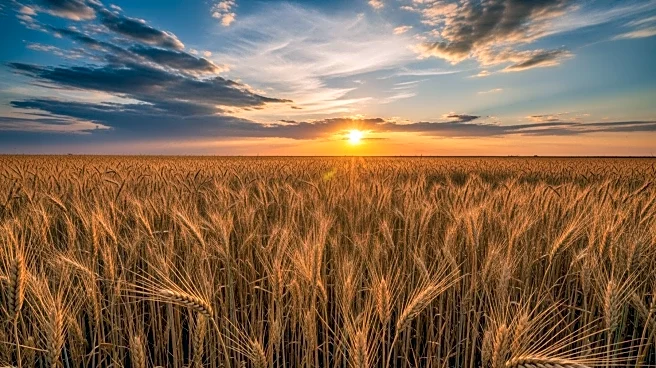What is the story about?
What's Happening?
American farmers are experiencing significant economic challenges due to President Trump's tariff policies, particularly in relation to China. The tariffs have led to a decrease in Chinese orders for American crops, notably soybeans, which are crucial for Midwest farmers. The American Soybean Association has reported that soybean orders from China are significantly lower than expected during the harvest season. This situation has resulted in increased financial stress for farmers, with small business bankruptcies reaching a five-year high. Despite these difficulties, many rural Americans continue to support President Trump, believing that the tariffs will ultimately benefit them by forcing countries like China to negotiate fairer trade deals.
Why It's Important?
The ongoing trade tensions and tariffs have profound implications for the U.S. agricultural sector, which is a vital component of the national economy. Farmers are facing increased costs for fertilizers and equipment, exacerbating their financial strain. The loyalty of rural voters to President Trump, despite economic hardships, highlights the deep political divide and the influence of identity politics in rural America. The tariffs could lead to long-term shifts in global supply chains, with countries like China potentially sourcing agricultural products from other nations, such as Brazil, instead of the U.S. This could have lasting impacts on American farmers and the broader agricultural industry.
What's Next?
Farmers and rural communities are closely monitoring the outcomes of President Trump's tariff policies, with expectations for tangible results within the next 18 months. There is hope that the tariffs will lead to new trade agreements that benefit American agriculture. However, there is also concern about the long-term damage to supply chains and the potential for continued economic hardship if the situation does not improve. The administration's expansion of federal subsidies and crop insurance may provide some relief, but the uncertainty surrounding trade relations remains a critical issue.
Beyond the Headlines
The situation underscores the complex relationship between economic policy and political loyalty in rural America. Despite financial pressures, many rural voters remain steadfast in their support for President Trump, driven by a sense of shared identity and opposition to urban liberalism. This dynamic reflects broader cultural and political shifts that have been developing over decades, influencing voting patterns and political affiliations.















